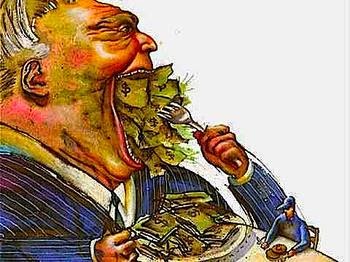Now, what am I reading? The BANKS in South Korea are reluctant to a total ban of cryptoz, while the government pushes for it. Why?
In an article in a Norwegian financial publication published this morning, one can read about how the South Korean government are imposing regulations on cryptoz. For the purpose of reducing "criminal activity" regards to it. Getting in their taxes that is.
Link to the article on E24.no (Norwegian)
So, nothing surprising about that. The Korean crypto-people are already pretty fed up with their government, calling them "virtualgovernment" in response to the government defining cryptos as "virtualcurrencies"(가상통화). Some government people and politicians do believe they are doing everything in the best intention for the people, while others are really just honest to themselves at least, making a career out of being a duchebag. The problem is still the same, they are involved in the most destructive organization known to man, and they are both prepared to keep their power with acts of violence. The "good guys" for the greater good, and the bad ones, well, that's pretty obvious. From my perspective, even if it doesn't matter, the "bad ones", are the most likely to end up being the good when it really matters, as they do have a understanding of the basics, while the "good" ones are likely to hold on to their vision for a better world, no matter what the cost. Twisting morals, views and rhetoric on the way to keep their head above the moral water.
Anyway, what comes as interesting in this case is that the banksters, the frigging banksters, are reluctant to a total ban of cryptos. Now that is some weird shait I would say. Now could I do a reference to above statements regarding good/ bad theory? Probably, that's not the case this time. And the banksters are not known to be rational egoists either, simply egoists, irrational that is. So then what the heck could be the reason for such a counterintuitive reaction from their side? Well, I believe it's two possibilities.
1. The effectiveness the tech brings to their industry.
Like Ripple. Understanding that a total ban would potentially eradicate the investment incentives to bring forth the solutions they want to implement in their own system. Finally, after all this years, seeing some form of innovation on the basic level of their services. After all, we are in 2017, and it is still faster and cheaper to get on a plane with a suitcase of cash, and delivering them physically, than doing a big amount international transfer through the banking system . Pretty mindblowing and hilarious I would say.
2. The individual banksters personal investments in crypto.
Now this theory might be my favorite one. We know that cryptos has gotten to a point in South Korea where a relative large portion of the inhabitants are into it investmentwise. Now, this also applies to banksters. Or bankster wankers as @Suppoman are addressing them (rightfully) as. Maybe what we're really seeing here is the banksters being disloyal to their own industry simply because their Ethereum, Substratum and so on are passing way beyond what they can hope to earn in working 10-12 hours a day in a fraudulent system? And obviously understanding that their hopes for another 1000% on their already fleshy investment would evaporate if a total ban would be put in place? (Acctually it would only take more time, but thats another post).
Obviously it might be a combination of several factors, still, lets hope its the second one, for because if it is, then the same will apply to the "bad politicians". We know it is a real thing as one South Korean politician has already been caught in inside trading based on his own statements to the public. Well, this will not be the case for "the good intention politicians", and also by this making them far worse for the outcome and how things are going.

There is also the nuance of collectivism that runs quite deep in the Korean culture. I think this needs to be considered when even constructing the lines that differentiate the "bankers" from the "government." Such lines look different in South Korea than they do in the West. The prospect of a decentralized, non-associated currency is breathtakingly threatening to the Korean governments structure of operation in the country - not because the government is oppressing the majority of Koreans into conformity but because such conformity is an expression of patriotism and culture in Korea.
They need their taxes to continue their overpriced and not needed services :) All governments are the same in principle, some more than others. And cryptocurrencies was suppose to have that kind of an effect on governments and central banks. There is surely other and hopefully better ways to express patriotism and culture than through a centralised currency barely 70 years old. :)
Pretty mindblowing and hilarious I would say...
The way things are done in korea are sometimes not easy to understand..
It looks like a picture is getting drawed if one pull this info together with some other info. Basically looks like there is nothing to fear, because they are all into crypto, and every man is his closest one, as we say in Norway.
This post has received gratitude of 1.61 % from @appreciator thanks to: @deismac.